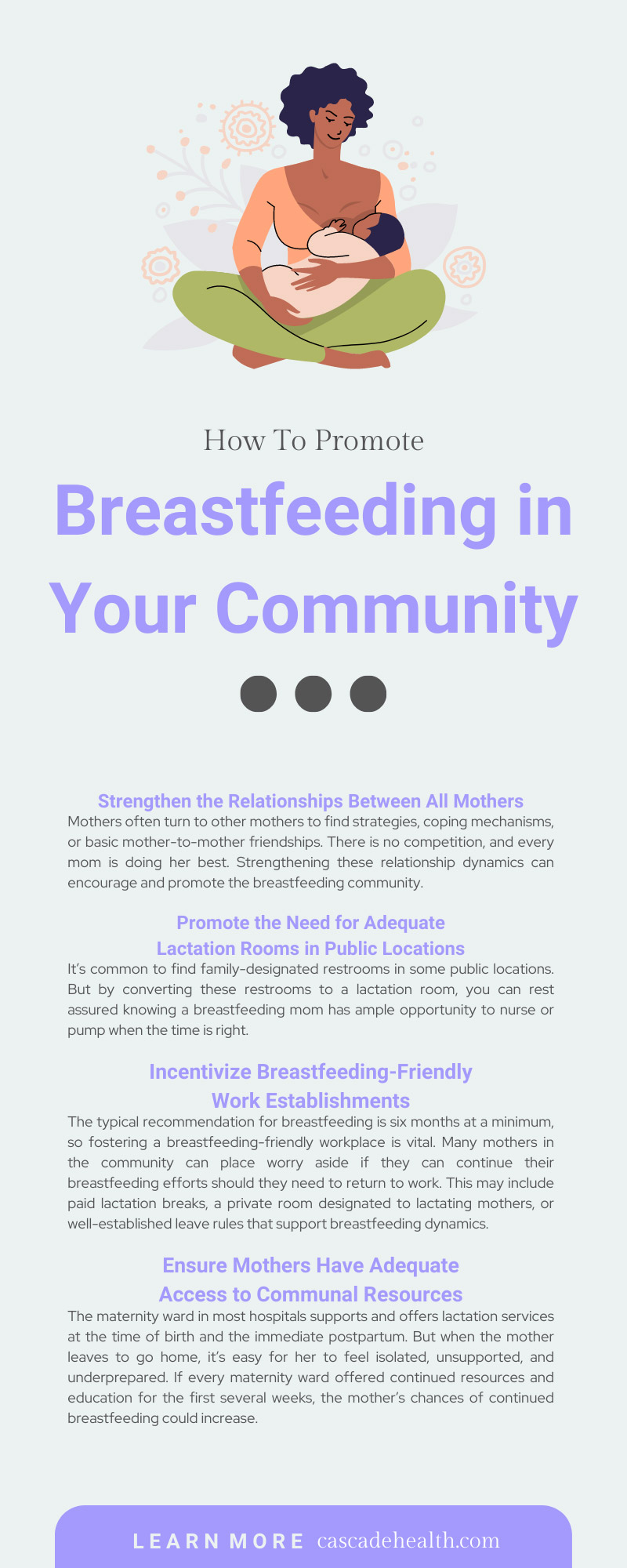How To Promote Breastfeeding in Your Community
It’s not uncommon to peer around your local community and find a breastfeeding mother. But it might be unusual for you to offer support, relief, or information if you lack the awareness to do so. Many mothers today attempt to nurse their newborn while still in the care of their maternity ward, to return home and give in to a lack of support, education, and skill.
The benefits of breastfeeding are not new; they are astounding and have lifelong health advantages for the mother-baby dyad. It’s imperative that we collectively promote the breastfeeding journey in our local communities to ensure every mother receives the support she needs and that every baby receives the nourishment they deserve. This article discusses practical strategies to streamline this promotion and uplift the journey for every mother who chooses it.
Strengthen the Relationships Between All Mothers
Mothers often turn to other mothers to find strategies, coping mechanisms, or basic mother-to-mother friendships. There is no competition, and every mom is doing her best. Strengthening these relationship dynamics can encourage and promote the breastfeeding community.
Implementing mom-only support groups, events, and social gatherings can offer a safe place for those in the community who need the space. Additionally, holding space for like-minded individuals can boost overall morale and increase positive mental health.
Promote the Need for Adequate Lactation Rooms in Public Locations
It’s common to find family-designated restrooms in some public locations. But by converting these restrooms to a lactation room, you can rest assured knowing a breastfeeding mom has ample opportunity to nurse or pump when the time is right.
Sometimes, it’s hard to predict when a baby needs feeding. It isn’t fair to say a mother must stay home until she finishes pumping for the day. By creating and offering a mother’s room in public locations, the community of breastfeeding mothers will feel more supported and adequately equipped no matter where they go.
Incentivize Breastfeeding-Friendly Work Establishments
One primary issue with breastfeeding today is the nationwide lack of supported maternal leave. When the mother must return to work, this can effectively hinder or damage the breastfeeding relationship and dynamics.
The typical recommendation for breastfeeding is six months at a minimum, so fostering a breastfeeding-friendly workplace is vital. Many mothers in the community can place worry aside if they can continue their breastfeeding efforts should they need to return to work. This may include paid lactation breaks, a private room designated to lactating mothers, or well-established leave rules that support breastfeeding dynamics.
Ensure Mothers Have Adequate Access to Communal Resources
The maternity ward in most hospitals supports and offers lactation services at the time of birth and the immediate postpartum. But when the mother leaves to go home, it’s easy for her to feel isolated, unsupported, and underprepared. If every maternity ward offered continued resources and education for the first several weeks, the mother’s chances of continued breastfeeding could increase.
It’s common to feel good about the process while in the hands of immediate care and then go home only to end up feeling overwhelmed and helpless. Knowing where to go or who to call for help can make or break a mother’s long-term breastfeeding experience. Additionally, attending group events hosted by the local maternity ward is one of the best ways to use a breastfeeding model, which can further assist in educating best practices and techniques to a new mother.
Advocate for Mother-Baby Dyads on Maternity Wards
The mother-baby dyad in the first moments postpartum is vital to a successful breastfeeding relationship. Often, hospitals or maternity wards will directly implement the use of pacifiers and formula supplementation or create great distance between the mother and baby. All these factors can contribute to decreased success and hinder the baby’s ability to learn to nurse from birth.
Advocating for the mother-baby dyad can solidify the bond and connections necessary for the baby to establish a unique-to-them suckle. Intervening in the breastfeeding connection with external comfort measures can sever the proper rooting and suckling nature of the mother-baby dyad.
It’s essential to note that should a mother wish for external comfort measures, adhering to these wishes takes precedence as this is the best way to offer secure support.
Ensure Adequate Education To Support Partners
Simply educating mothers on breastfeeding and its benefits is not enough. Many mothers rely on their support partners or own mothers for additional information, guidance, and support regarding their newborns.
By ensuring the support partner, such as the baby’s father or mother’s partner, is adequately versed in the fundamentals of breastfeeding, you are increasing the efforts of the birth mother’s support team. Should the mother find herself in a time of need, she can rely on these individuals and find solace regardless of the issue.
Sometimes she may only need an ear willing to listen or a break from a night feeding. When everyone around her holds the basic knowledge, they are more compassionate and willing to lend a hand.
Harness the Power of Social Marketing
We must never underestimate the power of social marketing. Through various social media platforms, caregivers, educators, and supporters can channel their message around breastfeeding aids and support and reach young adults, expecting mothers, or current mothers and spread the education rapidly.
In addition to spreading basic information, this is an excellent opportunity to advertise local support groups and events and create a community outreach spot for those in need of solutions. Often, when a mother no longer feels alone in her struggles, she begins to feel supported and implements actions for positive change.
Cascade Health Care is an advocate for the mother-baby dyad and the importance of breastfeeding support within the community. We offer various teaching aids and devices to ensure each facility and care practice has adequate and appropriate tools to provide thorough training and education to mothers and babies in need. Partner with us today to learn more about our comprehensive inventory of support devices!

Recent Posts
-
Tips for Maintaining Milk Supply When Returning to Work
Returning to work after welcoming a baby introduces logistical, emotional, and physiological challen
-
9 Items EMTs Should Have Stocked for Prehospital Deliveries
Prehospital deliveries rarely announce themselves with perfect timing. One minute you take a routine



